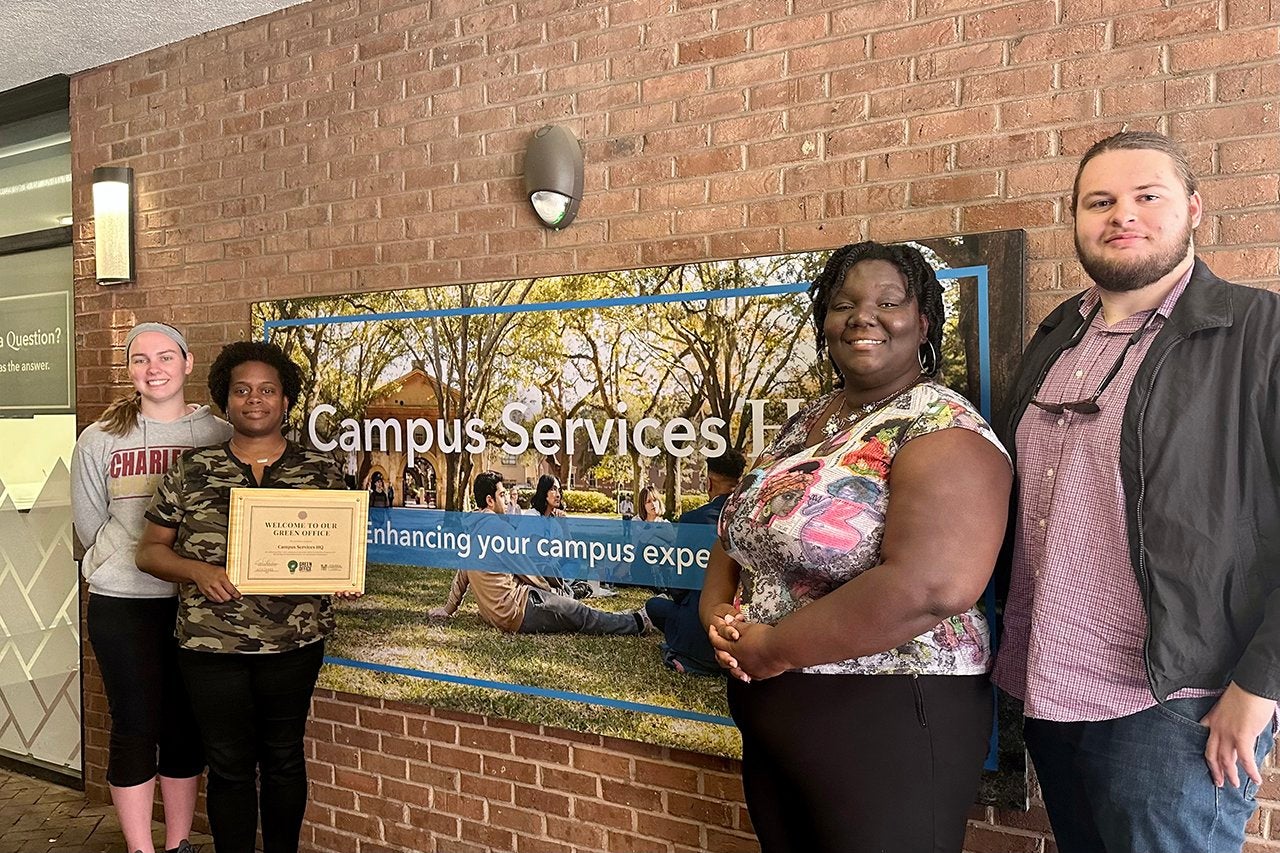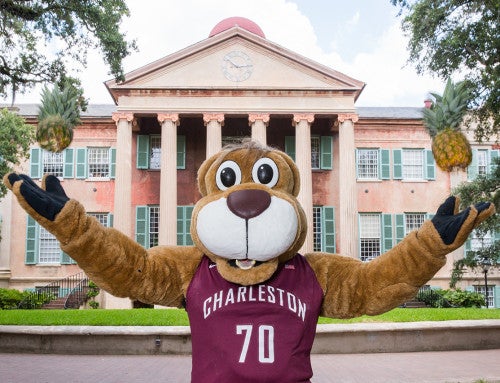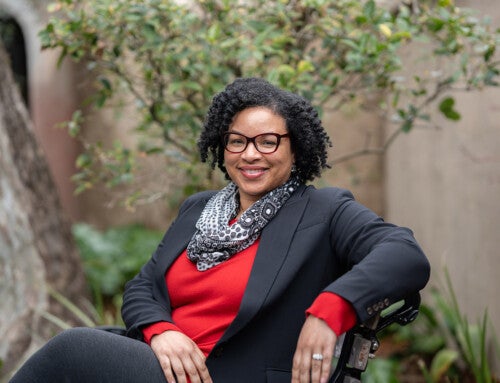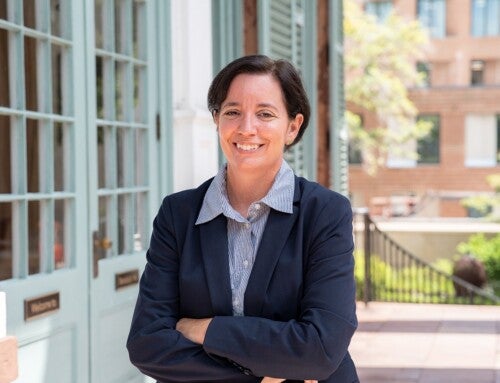Above (l–r): Campus Services HQ staff Jessica Taylor, January Nelson, Monica Benyard and Orlando LaPaz with their Green Office certificate. (Photo by Meredith English Perrone)
Campus Services HQ is now a silver-certified Green Office through the Center for Sustainable Development, and additional Campus Services buildings – including 40 Coming Street, Mail Services, and the Sottile Theatre – are working toward the same goal.
When Josh Bloodworth (M.P.A. ’15), director of information services for Campus Services, approached Campus Services HQ management with the idea of becoming Green Office certified, everyone was eager to learn more.
“Between my time at the College as a graduate student, my role with the Quality Enhancement Plan and sustainability literacy, plus my own personal interest in environmentalism, I was excited to see this offered on campus,” says Bloodworth. “In my current role, I float between our office spaces and dining locations, and I see the major impact we can have when we all work a little greener.”
“Sustainability – environmental, fiscal and social – is part of our mission in providing high-quality programs, services and facilities for our students and employees,” says Ashleigh Parr, director of Campus Services. “Our Dining Services team has been at the forefront of sustainability on campus for years, with composting at all our dining halls, purchasing standards that focus on environmental and social best practices, and more, so it’s fantastic to formally bring more of our office areas into the fold.”
With the support of CSD Associate Director Nicole Killen (EVSS/M.P.A. ’23) and the Green Office intern, Campus Services identified a sustainability ambassador for each of its physical locations. Meredith English Perrone, marketing and communications manager, took on that role for Campus Services HQ, and she and Bloodworth got to work using the Green Office Checklist.
“We looked at the obvious things,” says English Perrone, “like, are we recycling properly (and what does that mean?) and turning off lights when not in use – and also some unexpected steps, like adding plants to the office and refreshing our diversity and inclusion training. Nicole was incredibly helpful – she walked through the office and talked us through everything.”
Bloodworth adds, “We’re really using the checklist as a starting point – there’s always room for improvement and best practices change over time.”
Although the certification process was easy, Campus Services had some questions along the way. That’s why the team has put together this list of helpful questions and answers for other offices and departments interested in becoming a Green Office.
What is Green Office certification?
The Green Office Certification Program provides faculty, staff and students with the knowledge and resources to integrate social inclusion and environmental consciousness within working spaces. The program recognizes offices for achievements in different forms of sustainability and provides the tools and resources to help offices improve.
How are offices evaluated for Green Office certification?
There are six areas of evaluation: (1) waste, (2) energy, (3) water, (4) human health and environmental quality, (5) involvement and (6) accessibility.
 How do we know what can/cannot be recycled on campus?
How do we know what can/cannot be recycled on campus?
Use this handy guide! And remember that it’s always best to separate paper products from (plastic, glass, aluminum, etc.) containers. More information about recycling is available on the Zero Waste initiative website.
Can we recycle campus Chick-fil-A cups?
Yes! The cups used on campus are paper, so just give them a rinse first. (Please note that if you visit other Chick-fil-A locations and get a foam cup, those cups are not recyclable; they must go in the landfill trash.)
What about nontraditional items? Can any of them be recycled?
The TerraCycle program is a great way to recycle a lot of items, including office supplies like pens and markers, but also personal care products. These items can all be brought to the TerraCycle container at 207 Calhoun St., or you can even request one for your office space.
How can we be more sustainable with our office supplies?
First, get organized and take stock of what you have already. Try to keep supplies in a central location so everyone knows where to get what they need. If you have something you don’t need, see if another office on campus wants it (and vice versa). Check with Central Stores and Warehouse or reach out on Yammer before buying new.
Can we compost things from our office on campus?
Yes, you can compost on campus, but employees must take it to compost locations themselves. You can take food scraps to the compost bin at the Warren Place Garden (WP Lot), and compostable plastics and containers can go in the Smart Recycling carts next to Liberty Street Fresh Food Co. (8 Liberty St.) and City Bistro (80 St. Philip St.). Paper towels can go to either location.
What does “zero waste” mean, anyway?
The Zero Waste initiative has a goal of diverting 90% of the College’s waste from the landfill by 2035. The first step is to avoid waste in the first place; from there, it’s a matter of trying to reuse/repurpose what we do have and, ultimately, recycling whatever we can.
How can offices fulfill the social inclusion and accessibility aspects of Green Office certification?
Among other things, office staff can complete (Q)nversations (formerly SafeZone) training through the Gender and Sexuality Equity Center. GSEC offers facilitated conversations around building inclusive communities with a focus on the challenges faced by LGBTQ+ members of campus.
What’s the next step for becoming a Green Office?
If you’re interested in taking the next steps, reach out to [email protected] or simply fill out the Green Office Interest Form.





